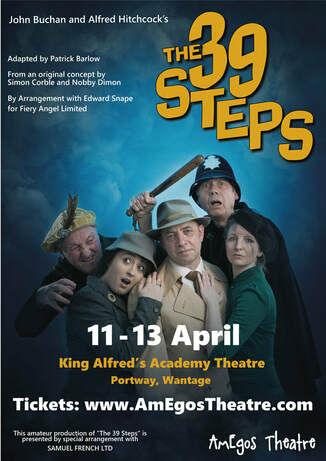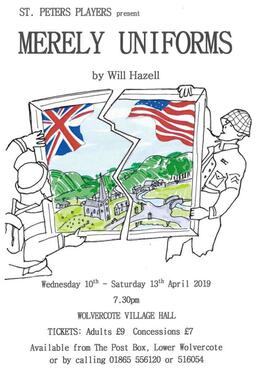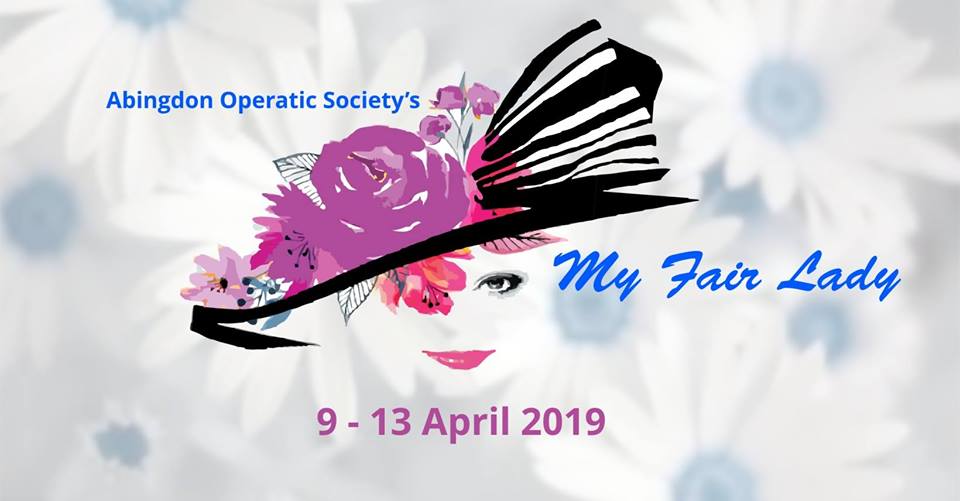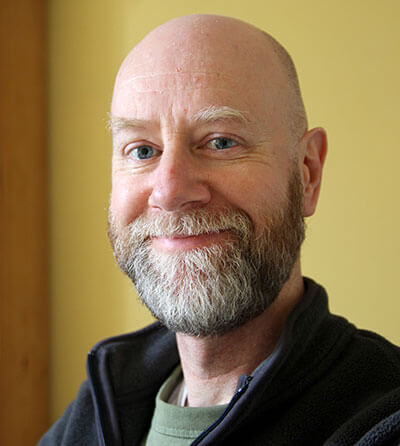|
THE 39 STEPS adapted by Patrick Barlow from a concept by Simon Corble and Nobby Dimon
AmEgos Theatre King Alfred's Academy Theatre, Portway, Wantage, OX12 9BY 11-13 April 2019 For some reason, I failed to see Patrick Barlow's comic adaptation of John Buchan's adventure story during its nine-year run in the West End. So I was delighted when Amegos Theatre presented me with the chance to do so. In this spoof tale of derring-do (inspired by Hitchcock's film version), all the characters are played by just five performers, sometimes with multiple roles in the same scene. Add to that Patrick Barlow's trademark removal of the 'fourth wall' (where the actors come briefly out of character to wrestle with recalcitrant props and so forth) and John Buchan's tale of action and intrigue becomes a very funny and inventive evening of entertainment. It was also very well cast. Richard Hannay (Rob Thorpe) meets the mysterious Annabella Schmidt (Helen Harrison) at the theatre. They go back to his place where she is murdered by an unknown assailant. In the process, Hannay stumbles across a dastardly plot by a foreign power to smuggle vital military secrets out of Britain. Hannay's adventures in trying to foil the plot take him up to the Scottish Highlands and back to the London Palladium, before the spies and plotters are unmasked. In the meantime, he is abducted by enemy agents (Bill Jestico and Martin Waymark), evades capture by the police, who believe him to be a murderer, and has a romantic encounter with Pamela Edwards (Sam Winskill), who wants to turn him over to the authorities until, that is, she discovers the truth... Director Lesley Phillips was fortunate in having five such talented performers. Rob Thorpe's rugged, unflappable, pipe-smoking Richard Hannay gave a well paced and understated performance. That's a good thing. It would have been easy to have hammed it up, to have succumbed to what Alan Ayckbourn calls 'waving from the train' at the audience. Rob showed the necessary discipline not to do so, presumably with the odd prod from the director. Sam Winskill gave us a petulant, feisty and sometimes perplexed Pamela. Her double act with Rob had the right chemistry about it. The will-they-won't-they scene where Hannay and Pamela realise that they have fallen in love with each other was played pitch perfect. Helen Harrison had only two major scenes. Based on what I saw, it is a pity that her talents were not used more in this production. Her first appearance as Annabella, the foreign beauty with a secret, was well judged without being over the top. Most remarkable was Helen's performance as a corpse, having to remain rigid, while draped across an armchair, for several minutes, until a very funny piece of business (I shan't spoil it) allowed her to relax. But Helen's best and funniest role was as Margaret the Scottish farmer's wife, who takes in Hannay while he is on the run from the police. She soon develops a schoolgirl-like crush on him. Her characterisation was beautifully drawn. There was some hilarious, frenetically energetic comic business with some suitcases, which had the audience in stiches. There was also a final, wistful look from the window, as Hannay runs off into the night, which was a masterful piece of comic timing, deservedly earning a laugh from the audience. Last, but by no means least, were Bill Jestico and Martin Waymark who played all the rest. They were credited in the programme as clowns. They were, as cricket fans might say, good all-rounders. They probably had the most fun of all the cast, playing an array of male and female roles, from travelling salesmen to Scottish landlady to master villain to policemen. The double act worked very well in the manner of a musical hall act. The physical contrast between the two helped here: Bill the stockier of the pair; Martin wiry and angular. As well as playing Hannay, Rob Thorpe also built the set. There was an inventive use of walk-in scenery on wheels. So one float was a box at the theatre. Trundled round 180º we were in Hannay's flat. Then there was the ingenious use of suitcases as pieces of furniture. My one criticism is that some of the scene changes in the first act could have been a little slicker. Patrick Barlow's script has all the promise of a very successful show, as evidenced by its long run in the West End. However, this is no plug-and-play production. The key component was a cast with a feel for comic timing and flow. Lesley Phillips chose well and directed her actors into delivering an accomplished evening of escapist comedy.
0 Comments
MERELY UNIFORMS by Will Hazell
St Peter's Players Wolvercote Village Hall, Wolvercote Green, Wolvercote, Oxford, OX2 8BD 10-13 April 2019 Merely Uniforms is an ambitious play for several reasons. Firstly, it deals with big, serious subjects. Secondly, it has a large cast (over twenty) on a small village hall stage. Thirdly, it advertises itself as a comedy-drama; always a difficult genre to pull off successfully. How far did the resulting production match up to the high bar they'd set themselves? Actually, surprisingly well (with a number of caveats, of course). Will Hazell wrote and starred in this rather different take on the home front during the Second World War. It is an examination of the conflicts, rivalries and insecurities thrown up in a society engaged in total war, and how those external forces interact with the pre-existing social and emotional issues troubling individual characters. It also questions the nature of war itself and the tension between society, its institutions and the individual. Oh, and it also throws in some comedy as well. You understand my point about its being ambitious. It is 1944, and we are in the isolated village of Little Widdle, a community that prides itself on keeping the outside world at a distance. The trouble is, wartime has brought the outside world to the heart of the village in the shape of the Army, the RAF and the US Army. The village pub, the Angry Mallard, has been taken over by the armed forces, and fights and disorder have become the order of the day. Worse still, the outsiders have set up camp on the site of the village festival. This is an event that has taken place annually since the seventeenth century, and represents something very important about the identity and self-confidence of the village. The village committee, under the leadership of Mr and Mrs Caswalden (Andrew Churchill Stone and Yvonne Janacek), decide that something must be done. They hatch a cunning, albeit rather far-fetched, plot to sow conflict and division between the RAF and the US forces, in the hope that the resulting chaos will persuade their commanding officers to remove the troops from Little Widdle. In the end, the plan is successful but redundant, as D-Day intervenes, and all the armed forces leave for Normandy. The festival is saved, but everyone involved has learned something valuable about themselves and others. The main sub-plot of the play is the burgeoning romance between the awkward, bookish Private Harold Furze (Will Hazell) and Clementine Phillips, the village school teacher (Charley Middleton). Harold is a fish out of water in the Army: geeky, shy and incompetent when it comes to military duties. Somewhat naively, he is surprised that the Army is constricting his individuality! He confides these thoughts to Clementine. She in turn tells him of her cynicism about the war, her repulsion at the death... on both sides. Although these scenes between Harold and Clementine charted the growing together of the two lovers, they tended to be a bit preachy and seemed more taken up with delivering a message rather than revealing a relationship. Nevertheless, the strong performances of Will and Charley drove the scenes along, in spite of some shortcomings in the script. More successful, I thought, was the conflictual relationship between Harold and his fellow soldier Private George Gibbles (a terrific performance from Isaac Alcock). 'Gorgeous' George is permanently 'on the pull' with female military personnel and regards Harold as 'a posho'. They come from different worlds. Yet their reconciliation, thanks to their comrade Private Roger Rowlands (a nicely understated performance from Tony Bywaters), avoided cloying sentimentality. A simple handshake and a bit of embarrassed foot-shuffling delivered the punch of emotional truth. The one piece of high emotion that did work was from Clementine's father, Capt. Trevor Phillips (full praise to David Smith for his character's journey from stuffed shirt old buffer to tearful breakdown and back again). Capt. Phillips has always refused to speak about Clementine's late mother, who died in the First World War. Clementine is exasperated and resentful of her father's mute response whenever she raises the subject. Her father's refusal to divulge is driving them apart. It feels as though a part of her is missing, she confides to Harold. The dam breaks at the end of the play, as her father pours out his grief to Clementine, and she finally discovers how her mother was killed by enemy action, leaving the infant Clementine the sole survivor in a bombed-out building. Surrounding these serious matters was an array of more comic characters, providing light relief from the heavier material of the play. I particularly liked Jane Hemmings' performance as Lady Beatrice Ryder, who holds nightly parties for servicemen at her home, determined not to miss out on the delights of soldiers away from home. This was a well judged, enjoyable comic performance as a predatory Amazon. Her mother, Lady Petunia Ryder (Elizabeth Kirkham), is hardly less restrained in her picking the low-hanging fruit of sex-starved soldiers and airmen. Lady Beatrice's cousin Squadron Leader Frederick Swallow (Pete Drury) presented us with a Blimpish caricature of the British officer class: utterly out for himself and passing up no opportunity to bed young women. Pitted against him is US Army Major Billy Steelman (Sean Hazell), equally libidinous and confrontational towards his British counterpart. Their stand-up argument at Lady Beatrice's dinner party triggers the conflict between British and US service personnel that has been planned by the village committee. Co-ordinating a cast of more than twenty actors on a small stage was certainly a challenge for director Pete Welply, but he managed without ever making the place seem crowded. There was adroit use of upstage and downstage areas, especially in the scenes in the village pub. The set design was simple yet effective, and scenery changes were mostly carried out efficiently in the time available (although not always terribly quietly!). This was a difficult and, in many ways, complex, play to stage, but Pete Welply achieved a production that delivered sufficient emotional impact and entertainment value. Will Hazell's well structured new play set its sights high. Although occasionally falling short of those lofty goals, the resulting production surprised the present reviewer, in a good way, and certainly made the journey to Wolvercote Village Hall worthwhile. MY FAIR LADY by Alan J Lerner and Frederick Loewe (based on the play by George Bernard Shaw)
Abingdon Operatic Society Amey Theatre, Abingdon School, Park Road, Abingdon, OX14 1DE 9-13 April 2019 Abingdon Operatic Society should have reason to feel pleased with their latest production, My Fair Lady, based on Tuesday's opening night performance in a mainly full Amey Theatre. Most people will be familiar with George Bernard Shaw's story from his 1913 stage play Pygmalion. Henry Higgins, a professor of phonetics, has a bet with his friend Colonel Pickering that, in six months, he can coach Cockney flower girl Eliza Doolittle and pass her off as a duchess. He succeeds, but then casts aside his creation, as one might a laboratory rat that has fulfilled its usefulness. Despite all the fun, humour and great musical numbers, we are left with an unattractive Higgins. Not so much a man who cynically exploits others, so much as one who is completely dead to the possibility of finer feelings or self-respect among his social inferiors. Although Shaw's play was a success and is still performed today, his modern day re-working of the ancient Greek myth about the sculptor Pygmalion, who falls in love with his own creation, is probably better known to most through Lerner and Loewe's musical. There was much to enjoy in AOS's production, directed by Joy Skeels. Not least were the leading man and leading lady, Duncan Blagrove as Henry Higgins and Kate Brock as Eliza Doolittle. Both have wonderful singing voices and Blagrove's clipped accent gave more than a nod towards Rex Harrison's famous screen performance as Higgins. Here we had an attractively feisty Eliza, but with the requisite pathos in the final scenes of the production, against an irascible, self-obsessed Higgins who really wasn't interested in anyone but himself. Both Brock and Blagrove handled the humour well without laying it on with a trowel. Rob Bertwistle's lovable old buffer of a Colonel Pickering was happy to give the limelight to Higgins but was always present in the action. He judged about right the cautious, sotto voce tone of Pickering's friendship. A man willing to bolster Higgins' ego but sound a dissenting note if necessary. Special mention must be made of Alfred Doolittle (Michael Winiarski), who was one of the highlights of the show for me. As an American, Winiarski was conscious, he told us in the programme, that he should avoid the Dick Van Dyke trap when it came to Cockney accents. He did fine in that regard. More memorably, he came close to stealing the show with his performance of Get Me to the Church on Time. In fairness, choreographer Jess Townsend deserves her share of the credit for this, and other, numbers in the show. Nevertheless, Winiarski brought an infectious energy to this number and indeed to his role throughout the show. Plaudits also to Paul Bruce as Eliza's besotted suitor Freddy Eynsford-Hill and his heartfelt rendition and reprise of On the Street Where You Live. There was a nicely judged performance from Lynne Winter as Henry Higgins' mother. Warmth and partisanship for Eliza and eye-rolling tolerance for her bachelor son's basic lack of social skills when it came to the opposite sex. There were some beautifully delivered comic put-downs of Higgins by his mother. I also enjoyed Stephen Webb's appearance as Zoltan Karpathy, the snobbish Hungarian whom we meet at the Transylvanian Embassy Ball. Stephen gave us an amusingly physical performance of this comic character. Extra Brownie points to him for hanging on to his beard, as the make-up department appeared to have run out of glue! I'd forgotten just how many good tunes there are in My Fair Lady, so many of which have become standards. Musical director Mark Denton is to be congratulated on drawing out a top-notch vocal performance from not only the principals but the chorus too. Particularly noteworthy were With A Little Bit of Luck and, one of my favourites, Ascot Gavotte. Joy Skeels came up with an inventive set design. Imagine blocks the same shape as cereal boxes, but with casters on the bottom and about 15 feet high. These were moved around the stage from scene to scene. So, in the opening scene, they were positioned end-on to the audience, as part of the buildings of Covent Garden market. Then they were turned ninety degrees as a backdrop in Higgins' library. You get the idea. There was even a spiral staircase in one. The costumes were glorious, especially the black and white theme at Ascot. One criticism on the costume front. Whilst everyone else was wearing clothing that fitted an early twentieth century setting, Henry Higgins seemed to be kitted out in a twenty-first century brown business suit. The cut seemed completely wrong and stuck out like a sore thumb. Also, in the opening scene in Covent Garden, Higgins looked more like a 1950s trench-coated private detective. It jarred somewhat with the rest of the cast's apparel. Given the care that had been taken with other characters, this surprised me. In all, however, this was a splendid evening's entertainment, although, be warned, it's a show with a longer-than-normal running time (almost three hours plus an interval). Congratulations to director Joy Skeels, the cast and crew on a great musical experience. Can't wait for the next one! |
About the Author
Mike Lord has been involved with amateur theatre for over twenty years, mainly as an actor but also, more recently, as a director. Archives
July 2019
Contact me
Please use the Contact Form for anything apart from comments on blog posts. |




 RSS Feed
RSS Feed
